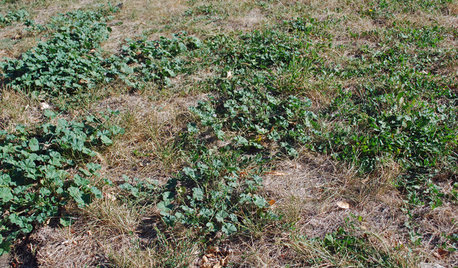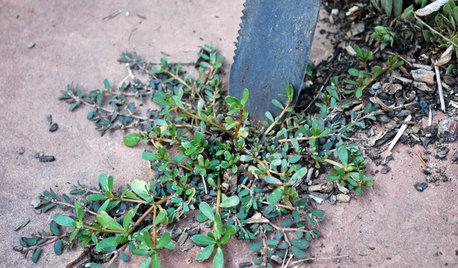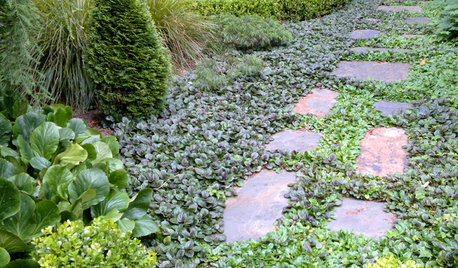Sprayed roundup weed killer
Sprayed roundup weed killer on my lawn by accident. What can i put on my lawn to stop the grass dying. I have levingston grass feed would this be of any use?
Comments (58)
creatrix
18 years agoBarb- read the directions on the Roundup. It says do not spray near water. It will impact any aquatic animals.
JAYK
18 years agoBarb,
There are formulations using Roundup's active ingredient that are labeled specifically for use in aquatic sites such as those you have described. Read the label for Aquamaster and Rodeo for specifics.
Here is a link that might be useful: Label site
Related Professionals
Graham Landscape Architects & Landscape Designers · Norton Shores Landscape Architects & Landscape Designers · Walnut Landscape Architects & Landscape Designers · Maple Valley Landscape Contractors · Arlington Landscape Contractors · Monterey Landscape Contractors · Mount Sinai Landscape Contractors · North Ridgeville Landscape Contractors · Tinton Falls Landscape Contractors · Wareham Landscape Contractors · White Bear Lake Landscape Contractors · Town 'n' Country Window Contractors · Aventura Window Contractors · Decatur Window Contractors · Sarasota Window Contractorsirinap_shaw_ca
17 years agoIve recently sprayed my vegetable garden with roundup (before planting of course) and am wondering if there will be any health risks to planting my vegetables in it now that most weeds have died or if my vegetables will even grow. It was sprayed 6 days ago and im considering planting my tomatos in it now. Thanks!
username_5
17 years agoSkya,
The label tells you how long you must wait to plant after use. It isn't long.
If you are growing edibles I would encourage you to avoid the use of any herbicides or pesticides.
It isn't one of those things that kills you instantly, but there are no studies on the effects of chem a with chem b with chem c in the body over time.
When it comes to edibles it is all natural for me.
Just something to consider.
irinap_shaw_ca
17 years agoThanks for the quick response. I would prefer to go "organic" but my weeds are beasts. The garden hasn't been tilled in a good 4 years (other than by shovel here and there) because I don't have a way to transport one from the rental shop, unless I walk it home 5 miles lol. This will be the only time I use it. The label say's that roundup isn't soil reactive so I'm assuming it will be ok if I water the garden down nicely.
This week I will be boxing in my beds and raising them a foot or so and putting lawn edging around it to control the grass spread (garden shrinks an inch or two every year!)
One more question. Cedar or otherwise? I've heard both "no cedar" and "only cedar"
Which is correct?Thanks!
username_5
17 years agoCedar for what? Framing a raised bed? If so then DEFINITELY cedar.
It is the equivalent of pressure treated wood, without the chemicals.
A cedar frame should last you 10 years at a *minimum*.
I try to remain as organic as possible, but my general philosophy is 'organics for growing, synthetics for killing' ;-)
RoundUp works really well when you want everything dead. I hate thinking about the genetically modified crops designed to be sprayed heavily with it in the grocery store which is why I, personally, avoid all chemicals around my edibles, but when the weeds are out of control in an area it works.
irinap_shaw_ca
17 years agoYes cedar for framing :)
If only I had the extra income to buy strictly organic I would in a heartbeat! Thus, I grow what I can at home as healthily as possible. Still beats the supermarket produce full of who knows what. I suppose I would need organic seeds to produce organic veggies?
P.S. sorry for hijacking this thread lol
username_5
17 years ago- I suppose I would need organic seeds to produce organic veggies?-
Good grief no! LOL.
Let's talk this through in a rational rather than evangelical manner ;-)
To be organic means to focus on building healthy soil that 'solves' a lot of problems before they occur. It means to stay away from various chemicals that haven't gone through sufficient testing for us to know they are safe.
A seed is simply a seed. I don't care if the momma plant was dosed with cyanide. If it grows, it is all good.
The amount of toxin that could theoretically be in a seed isn't worth considering.
Just grow a garden full of produce where you use compost, manure, grains, kitchen scraps and other 'real' stuff as much as possible, use as little synthetics as possible, do not use herbicides or pesticides whenever possible and let that be that. Notice I didn't say never use them under any circumstances, just avoid them to the extent possible and the extent that you, personally, wish to.
There is no contest and there is no prize ;-)
Garden the way that makes *you* happy. For me it is in finding ways to use less 'manmade' stuff and more natural stuff with no worries associated with it. Whatever works for you, works for you.
irinap_shaw_ca
17 years agoSounds good to me! Thank you for your time. You seem very knowledgeable in gardening :o)
Goodnight and take care :)
re_lity_com
17 years agoroundup is not-so-bad as some peope would have you beileve. if you sprayed it on your grass more than about 45 minute to an hour ago your going to loose some/all of that grass. but to the lady who sprayed 6 days ago, your plants will be fine. the chemicals that make RU kill biodegrade into other non-plant-killing compounds in about 12-24 hours when exposed to sunlight and fresh air.
for those who think organics are better, lead, arsenic and other very harmful chemical elements can still be found even in organic produce. not ot discredit organics but it is not that much "safer" or "healthier" than non-organics.
that is my $.02
rsalt66_hotmail_com
17 years agoPlease advise me about a pasture sprayed with round-up. How many days should I wait before the horses can be turned out again?
oldmystic_yahoo_com
17 years agoMy neighbor graveled his whole yard and is now spraying roundup on it every month. I have a well which supplies me with drinking water less than 10 feet from his yard and is in the direct line of the water flow. Is this spraying a hazard to my health?
meldy_nva
17 years agoDee - It will depend on how deep the well is, and how soon it rains after each spraying. USGeological has done studies showing the presence of herbicides/pesticides in streams and rivers. The more shallow the well, the more likely it is that the 'cide or some of it's derivatives will percolate into the underground stream supplying the well-water.
If that well were mine, I'd arrange with the local Dept of Health to have the water checked frequently; if they can't then it would be worth it to me, to pay for a private lab to test.
JAYK
17 years agoIt completely depends on what herbicide he is using. Roundup's active ingredient, glyphosate, does not generally present groundwater contamination problems since it adheres to soil particles so tightly until it naturally biodegrades over time. Unless the surface soil particles are actually being washed into your well, you should not have a problem. There are other herbicides that have very different properties and can present groundwater problems.
Here is a link that might be useful: WSDOT fact sheet
tootsiem
16 years agoUpdate to my posting:
Rosa, in reply to your response, actually I know far more about this man than I stated. I wasn't speculating on the actions of this man. I had no intention on "polarizing" or "spreading misinformation" about Roundup. The fact is, Roundup did kill my dog. When I made that posting yes, I was extremely angry over having to watch my dog suffer a horrible death due to the irresponsibility of a man who since then has shown no remorse whatsoever for his ill actions. Our local Board of Health sent us a copy of a letter they sent our neighbor warning him that he has violated two city codes with his overuse of Roundup. They informed him that if it continues he will be fined and/or imprisoned. They also stated that they feel he was the cause of our dogs' death. This man had different lawn chemicals from years past that he "didn't know what they were." His words. He negligently pours chemcials down mole tunnels and chipmunk holes, and shows no regard for animals, children or mankind for that matter. He is a ruthless old man who cares for no one. Yes, I was wrong in making the comment about his son, but I will always wonder if he didn't somehow contribute to his son's sickness. That's my opinion, and I'm entitled to it.
Please do not disect my words. I merely stated a fact that Roundup killed my dog. That was my intent and nothing else. Please do not stereotype me. I do not have a prejudiced attitude toward Roundup if used properly according to the directions. It's overuse that becomes a problem.carolee1991
15 years agoHello,
My yard was vandilized. I don't know when it happend. But now the places where it has been sprayed is turning brown. Since it was only sprayed in a pattern should the entire yard be mowed over or just that area? How will the effected part effect the rest of the yard? Do I need to mow it? Also I took my dog out this AM (no rain) but somehow my sprinklers got turned on in the middle of the night and now the grass is wet too. So my questions is should I mow the grass down to nothing? Will this product affect my dogs paws? Can my chidren play in the front yard?
Thanks in Advance for all the information!
~Caroleecassieinmass
14 years agoCarolee- Someone vandalized your lawn with ROUNDUP!?!?! What is with people these days!!!!!!!!!!
gpivar
14 years agoI wanted to respond to the member who said Roundup sprayed by his neighbor killed his St. Bernard. I just wanted to comment that if you look up toxicity information on pure glysophate (which is the cehmical in Roundup) it is not violently toxic! And Roundup only contains a small percentage of it. My understanding is that it works by making it impossible for a plant to photosynthesize and that is why it isn't particularly toxic to mammals - because we don't. If a huge dog like a Saint had eaten straight glysophatwe I'm not sure even that would cause seizures! Sometimes we get hysterical and don't even bother to find out the facts. Besides which, St. Bernards are prone to epilepsy - it is somewhat common in the breed!
Just because something happens following something else doesn't mean there is a cause and effect. At one point, in Britain, the population of storks declined and one year later the birth rate declined. Cause? Effect? There are enough real problems and threats to worry about without making them up and not bothering to check facts - IMHOalsigirl
14 years agoFolks, please, please increase your knowledge about Roundup by using this link:
http://www.twilightearth.com/environment-archive-2/the-world-according-to-monsanto-full-documentary/
Remember, the main ingredient, glyphosate, is what the military used in Agent Orange to defoliate areas in Vietnam and you know the harm it did to our servicemen who were exposed. Because one other ingredient does not harm pests or plants, it got the "inert" designation. However, polyethoxylated tallowamine, or POEA is more deadly to human embryonic, placental and umbilical cord cells than the herbicide itself. Roundup is deadly and has been in our food chain for over 10 years.My husband was a painter and died from the cumulative effects of paint and solvent ingredients he was exposed to before breathing gear became mandatory. His doctors told him his brain damage was worse than as if he had been a chronic alcoholic all his life.
Watching and taking care of a man dying by inches over 11 years is painful, too. Cause and effect were documented on his death certificate.
Here is a link that might be useful: Environmental Health News
JAYK
14 years agoThe active ingredient in Roundup, glyphosate, was NOT part of Agent Orange in any way, shape or form. Agent Orange was a mixture of 2,4-D and 2,4,5-T, the latter contaminated with various dioxins (mostly TCDD) during the manufacturing process, which led to the problems. Glyphosate has nothing in common with these two compounds, not is it contaminated with dioxins during its manufacturing. Glyphosate ranks very low in toxicity.
The POEA surfactant in Roundup is similar in toxicity to soaps and detergents, all of which will prove toxic when bathing cells of any kind. The study referred to showed nothing new, as surfactants of all kinds can produce such effects. Such effects are not related to risk since such exposure cannot happen in real world conditions.
Roundup is not considered "deadly" in any toxicological way, not does it bioaccumulate in food chains. It is broken down by soil organisms completely over time.
Certain solvents in some paints, and other kinds of solvents, can most certainly be toxic to nervous systems, can be carcinogenic and display a host of other toxicologic effects when dosed over long periods of time. Linking Roundup to such well know and proven problematic chemicals is not founded by the facts.
Here is a link that might be useful: Pub med article
redrover2010
13 years agoI am a vet at a wildlife rehab and can tell you round-up is toxic. We treat many wild animals (squirrels and rabbits) who have been sickened by round-up and similar weed killers.
lauran26
13 years agoJust curious - how do you (and other vets) test for herbicides such as Round-up in sick animals? Also, what is the antidote and/or treatment? This could be useful info for those who suspect their animals have been affected. Thanks!
azbluiz1_aol_com
13 years agoI sprayed my horse pastures with roundup on Saturday. Today is Monday. Is it now safe to put my horse back in the pasture? There is still some short grass in there. If not, what should I do?
morz8 - Washington Coast
13 years agoToday sounds much too soon, information you probably should have had before spraying. I'd want my own vets advice, but since a holiday you may not find him/her in -
In the meantime, you could start with this information from Purdue.edu that states (Table 2) no grazing for 14 days after application.
Here is a link that might be useful: Purdue.edu publications
clairejr_sky_com
12 years agoEveryone, please do your homework on Roundup. It is not harmless, safe, biodegradable, or any of the other lies put about by the companies that sell it. here is a summary of the peer reviewed research on it (the report is actually on GM soy but contains all the Roundup research): http://www.gmwatch.eu/images/pdf/gm_full_eng_v15.pdf
Birth defects, cancer, endocrine disruption--in very small concentrations, much less than you are spraying.wmha67_hotmail_com
12 years agowill roundup poison potatoes ? can you eat potatoes that were sprayed on the leaves the plants are dying
morz8 - Washington Coast
12 years agoI would not eat them. Roundup (glyphosate) is systemic, meaning it is translocated from the foliage through the stems down into the root system. Potatoes, the tubers, are a part of that root system and would contain the herbicide. In reading, I find it takes only a little accidental drift of Roundup spray on potato foliage to deform the potato tubers so the edible part is most certainly affected.
kharma2k_earthlink_net
12 years agoWhen I bought my house 7 years ago I sprayed Round Up in various locations to kill poison ivy as I'm horribly allergic to it. A couple years later, I started losing pine trees next to the sites sprayed. I have now lost 4 very large trees. Coincidence? I think NOT, as I have at least 100 pine trees on my property and the only large trees that have died were located adjacent to where Round Up was used.
Five days ago I sprayed a couple of poison ivy plants in my front yard. I decided to keep my dogs confined only to the back yard, but yesterday, I inadvertently let my 50 pound dog out in the front yard for a few minutes. Within hours, she had broken out in hives and her face was swollen and itchy. She has vomited and had loose stools, but is looking much better today. I suspect the Round Up smelled interesting to her. No proof, although I will Never Ever use it around my pets again!!!! Anyone who thinks it's safe to use around mammals and food is in denial, IMO.
lhedt_hotmail_com
12 years agoI find that as to toxicity of roundup, if you get it on your hands, clothes, etc. it is not such a problem. Do wash it off though, it looks ugly. If you are worried about using round up near edibles, please keep in mind that in most grain paddocks (or fields, whatever), Roundup is used before the paddock is sown, before and after it is harvested and at least one more time in the year. Low levels of roundup digestion is relatively harmless, my dad says that it is the only pesticide on the farm that you could drink that would be harmless. The wheat and lentils, etc that it is used next to are then split or made into bread or whatever. If you want to see a really killer chemical (and believe me, these really stink), try out paraquat (used to kill whip thistles quickly before harvest) or 2,4-D Amine (a growth hormone) these are used irregularly but occasionaly around the farm, and 2,4-D is great for killing Marshmallow id anyone is interested. I suggest you wear all protective gear around these.
It is important to note: however, my Labrador did ingest some roundup recently (as in this morning). She found a small bottle of roundup that no one had seen for about 5 years, and she must have been chewing it while we were at church. She must have drank some. She also found a packet of snail pellets that also, no one knew about (we are more concerned about these). She vomited, it was green, and she had been a bit out of energy for most of the day. She is also excreting green liquid, which is strange. I will be hoping that she recovers very seriously.
saxonnn_hotmail_co_uk
12 years agoHi all, i ripped out my Primrosa Vulgaris plants yesterday, im going to plant some Cineraria 'Silver Dust', Begonia Nonstop and Geraniums in my borders soon. The problen is i have an infestation of Chickweed growing in my borders all the time, because i ripped out the winter plants and got out as much Chickweed as i could i turned the soil over which i now regret because some (alot) of the Chickweed is now buried under the soil. CAN I wear rubber gloves (obviously) and let the soil run through my fingers and turn the soil with my hand while im spraying it with Roundup? Will that still kill off the weeds even though most will be covered with soil again after being sprayed? Im not planting until 2 weeks after spraying but i will be mixing fertiliser into the soil a week after. I am a newbie at gardening but i am loving it and picking up common names and also latin names realy quick.
morz8 - Washington Coast
12 years agoDazla, don't spray your soil. Roundup has no soil action and must be sprayed on foliage of growing plants - in several days the herbicide then translocates through the stems and down into the roots, killing the weed.
There is more than one type 'chickweed', they can be either annual or perennial. Both are shallow rooted and not that hard to pull - the trick is getting to them before they set seed....seed that is going to germinate and create more weeds.
Once you've pulled any existing weeds (and all of us do weed, there is no such thing as a weed free garden), apply a mulch around your new plants. The mulch will bury any existing seeds and prevent most from germinating, while helping to conserve moisture and reducing your watering needs.
If you stay on top of the weeds, yanking them before they set seed, keep a persistent mulch on your soil, over time you will much less weeding to do. Not that you have to be compulsive about it, just consistent - it pays in the long term ;-)
jilbert57_embarqmail_com
12 years agoWell, from reading all of these postings it is clear that one thing is not clear: its not known if its safe for Roundup weed killer and your dogs going out on it. People either say its safe or toxic. So no help here. Sounds like it depends on the animal. An employee of ours says he sprays RU weed killer and his labs follow him all around while he is riding his ATV with sprayer. They don't suffer ill effects right then, but who knows about long term. I just looked on this site to see when I could let my two dogs back out to go to the bathroom after it had been sprayed, but it is clear no one here really knows. Too many differing opinions and personal "observations."
forestranger52_yahoo_com
12 years agoI am a forest technician and we spray roundup mixed with another herbicide in the forests to kill what we call woody interference, that shades out the small trees that we want to grow. Roundup only kills the plants that it is sprayed on, it has never bothered anything else in the forest. The trees remaining have never had a problem and I have inspected many thousands of acres that have been treated.
eburrows_maine_rr_com
12 years agoMy neighbor sprayed Roundup spray three times in the summer of 2010 to kill bamboo growing in his yard which is uphill from our house. This year he is using a chemical from Agway to try and kill the bamboo and has used it three times so far this year. We have a hand dug well only 20 feet deep and I told him this last year. All the chemicals he uses go into runoff water in the ditch when it rains and flows downhill towards our house into a small brook. Do I have reason to worry if his chemical use is contaminating the ground water?
dohdd3_aol_com
12 years agoIf you people would take the time to READ the directions BEFORE you use some of this stuff some of the events that I have just read would not have occured. I hate that an idiot sprayed his neighbor's yard and killed his dog. These products require some education and common sense to use. Dont apply if you expect it to rain (runoff). Keep your pets off and away from application areas for at least 24 hrs. Wash off immediately if it comes in contact with skin. And follow mixing directions! Dont take much, just a mist, you do not have to apply it like you are watering the plant. Just some advice from an ol farm boy!
rhizo_1 (North AL) zone 7
12 years agoDoug, I love the voice of common sense! Precious little of that, sometimes.
tishamcguire_hotmail_com
12 years agoSorry bud, your lawn is probably a goner. I use Round Up as an edging around my flower beds (all are surrounded by big boulders)as it saves time weed whipping. I have stopped using it in my garden, I till the heck out of it, weed the heck out of it, then layer cardboard or thick piles of newspapers around plants-not easy as I have 2 huge gardens-one is 150x 30 feet and another 40 x 30 feet.I do keep my dogs in while spraying brushy areas at back of garden-dogs will eat grass so better safe than sorry. And sorry organic people, I try to be organic as much as possible, but I DO USE PREEN
metfanlisa_aol_com
12 years agoMy flower beds used to be beautiful, but due to health issues, the weeds have taken over. It breaks my heart to see something I worked so hard on turn so ugly. But I can't in good conscious spray Roundup. I have a dog, and babies living on each side of me. In the grand scheme of the world, a few weeds do a lot less damage than spraying chemicals that have been proven to cause birth defects. Anywhere. Simplify, people!
2elissa
12 years agoperhaps we should all the take note of this very clear research:
it shows the necrotic effect of roundup passed through on a 1/5th dilution scale (far less than digested) on human cells.The USDA's toxicology chief (huber) is presently urging the Secretary to abandon the deregulation of all these genetic modifications (thanks to the intentional genetic alterations of the majority of the plant seeds, round up is now created from within the plants themselves as glysophate) and it is destroying both almost full term livestock in utero whose mothers consumed the feed of these crops as well as rendering the soil incapable of supporting the next cycle of crop. please research this issue we are facing a human crisis within 2 years if not resolved.
Here is a link that might be useful: round up kills human cells
Tiffany, purpleinopp Z8b Opp, AL
12 years agoRoundup is made by Monsanto. Do your own research about that company and see if you still want to patronize it.
People were told DDT was "harmless good stuff" to use at one point, also.
AndyWalters
11 years agoTootsie... are you sure it was roundup? Did all you grass die where sprayed. If so, maybe roundup. It would be unusual to use roundup for selectively killing crabgrass, because it will kill everything. I suspect that some chemical other than roundup was used, but without knowing what is was, it is hard to diagnose your dog.
Bee-in-the-garden
9 years agoReading letters on this forum it seems that many people are confused by how safe is weedkiller to use and a whole uneasy feeling is created that is not conducive to enjoying life in the garden. We shouldnt have to worry and be afraid for our health to have a garden! My thought is design your garden so that weeds are minimised by having a) less area in garden b)filling up garden areas with plants so weeds have less ground space to grow in. Mulch and more mulch, lawnmowing, weedeating, and finally a little hand pulling..then enjoy life in your garden without having to worry about being made sick. Finally get active about spreading the word on weedkillers being OVERALL not safe - I certainly wouldn't like to have neighbours who sprayed.
KarenBee876
9 years agoI'm heartened to read all the posts that advocate a chemical free garden and/or lawn. I'd like to mention that while RoundUp is supposed to be safe for humans it does disrupt the gut microbes that we all have and need for health. I have no idea if it does this for animals but I'm guessing that any animal, which relies on a healthy gut microbe population will be affected by doses of RoundUp. Also, for those who are interested in raised beds and a good way to feed your garden with no chemicals, check out lasagna gardening. This can also help with weeds (I think).
jerseygirl07603 z6NJ
9 years agoI'd like to add my .02 too. Last summer when I was out of town DH sprayed lawn with Weed and Feed. Not the same chemical as Round Up but IMO just as dangerous. He accidentally sprayed and killed everything in my vegetable bed, a camellia, a small forsythia bush and some perennials. (why/how he did this is still a mystery - either he hates me/my gardening addiction or the hose got away from him). I contacted the Scott's people to see when it was safe to replant tomatoes in that soil and was advised not to plant food crop for an entire year!!! DH is not allowed to use any such product again.
brandon7 TN_zone7
9 years agoGlyphosate, the active ingredient in most RoundUp products, is among the safest of chemicals found in most households. If used properly, it is MUCH safer than most cleaning products used in the average home. It is also SAFER for both you and your garden than many "organic" products. People are frightened by it because they haven't done their research or are "against it" often for "political" reasons (like having a grudge against Monsanto, unrelated to the actual chemical).
patricecampion
8 years agolast modified: 8 years agoGlyphosate is the subject of litigation, and will only increasingly be the focus of litigation in many future suits. It is extremely hazardous, and it is toxic to all life. Do your research, people. Never rely on another's advice because they could be paid by the company to enter false safe info on websites all over the Internet. Ask yourself basic logical questions like, how in the world can a toxic chemical intuitively know not to poison your tomato or your dog, but to target that bad dandelion only (for example). Stop believing that these toxins have been engineered to only target specific weeds. This is false. The basic premise of how this toxin works is "systemic". It kills everything in its path. Definitely do the research. Long term studies on ponds, rivers, etc have already documented the disastrous effect off glyphosphate on tadpoles, fish, etc. Stop handing over your responsibility for protecting the health of your pets, children, neighbours to websites to the toxic chemical makers. Be safe. When in doubt trust your natural instincts. make no mistake, glyphosphate causes cancer, and is already documented by health organisations as causing cancer. Yes, causing. Not correlating. Causing. This is major news. When the health agencies concur with scientific studies that glyphosate causes cancer, do you really still have any questions? Here is a helpful bit of research. http://pubs.acs.org/doi/abs/10.1021/tx800218n
gardengal48 (PNW Z8/9)
8 years agolast modified: 8 years agoYowza!!! The only statement that approaches any degree of accuracy in the above post is the one that suggests you do the research. Which the above poster has obviously not done.
"Ask yourself basic logical questions like, how in the world can a toxic
chemical intuitively know not to poison your tomato or your dog, but to
target that bad dandelion only (for example)."The answer to that is simple and is the same principle behind the development of beneficial pharmaceuticals that target disease organisms. It's called 'mode of action' - glyphosate's mode of action is to disrupt a metabolic pathway that allows for the biosynthesis of certain amino acids. This metabolic pathway (shikimic acid pathway) is specific to plants and some microorganisms. The absence of this pathway in mammals explains the low toxicity of glyphosate to non-target organisms.
"It is extremely hazardous, and it is toxic to all life" Again, a completely erroneous statement. After some 40 years of the most extensive scientific testing any pesticide has ever undergone, glyphosate is considered to be of very low toxicity and therefore is NOT considered to be "extremely hazardous". And it is obviously not "toxic to all life" - it just simply does not work that way (see above re: mode of action) and if it did, it would not be on the market. And the declaration that it is a causation for cancer is still under debate by world health authorities. First, it has never been documented that gylphosate is carcinogenic with humans - that's probably the major bone of contention with this assessment. The association was made based on very limited epidemiological studies which have been disputed by non-consistent patterns of positive associations indicating a causal relationship between total cancer or any site-specific cancer and exposure to glyphosate. The bulk of the determination was based on studies based on animal experiments submitted by the producers of glyphosate as evidence for the carcinogenic effect of glyphosate. And these findings were considered by various other agencies involved in this assessment (IMPR, FAO/WHO) who concluded that “In view of the absence of a carcinogenic potential in animals and the lack of genotoxicity in standard tests, the Meeting (IMPR) concluded that glyphosate is unlikely to pose a carcinogenic risk to humans” (does glyphosate cause cancer?)
Finally, had the above poster done her research, she would be aware that glyphosate is a non-specific herbicide. It does not just target weeds nor was it intended to just target weeds. This is a basic premise of any understanding of herbicides and to bother to post without knowing this elementary fact gives no credence to the rest of her rant. Junk science will always be junk science and simply spewing back sensationalized conclusions plucked from the online press without knowledge or understanding is merely ignorant fear mongering.
















rhizo_1 (North AL) zone 7